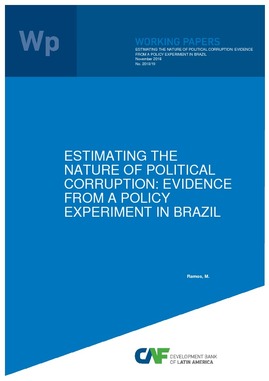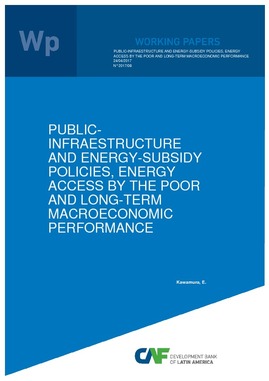Estimating the nature of political corruption: evidence from a policy experiment in Brazil
Abstract
This paper proposes a test to estimate the nature of political corruption in developing countries: embezzlement by self enriching politicians versus corruption that originates as a quid-pro-quo from campaign contributions. If politicians decide whether to be corrupt rationally, then increasing the punishment for corrupt practices or the probability of getting caught should reduce corrupt practices (Becker, 1968). If corruption is a response of politicians to firms that finance their campaigns, an increase in punishment should yield not only a reduction in corruption but also a reduction in the demand for projects that are corruptible, such as projects on infrastructure. We test these explanations for corrupt practices using a randomized policy experiment in Brazil. We exploit the fact that some municipalities were randomly chosen to have their probability of being audited increased and we analyze public data of block grants. We find a significant decrease in the resources requested by the mayors to execute projects in infrastructure. This effect is stronger if the municipality has been audited in the past, evidence that mayors respond to credible policies. Moreover, this effect is larger if the mayor’s campaign was strongly financed by construction companies. Finally, treated mayors have their performance in subsequent elections worsened and get less financed by construction companies after the experiment happened. In sum, our findings suggest that mayors are committed to campaign contributors and respond to larger probability of audits by reducing the amount of resources requested for infrastructure projects.
Subject
Country / Region
Date
2018-11-25Cite this publication
Belongs to collection

Author
Ramos, M.Items Relacionados
Government transparency and political clientelism: Evidence from randomized anti-corruption audits in Brazil
Political clientelism is considered a fundamental reason why politicians are not accountable and responsive to their constituencies. In this working ...
Public-infraestructure and energy-subsidy policies, energy access by the poor and long-term macroeconomic performance
This paper presents the main set-up and long-run results from a simple deterministic version of a dynamic stochastic general equilibrium model of a small ...
Government performance, taxation and citizen participation: evidence from Brazil
Fiscal contract theories of the state hypothesize that government performance affects tax collection and that institutions that foster representation ...



